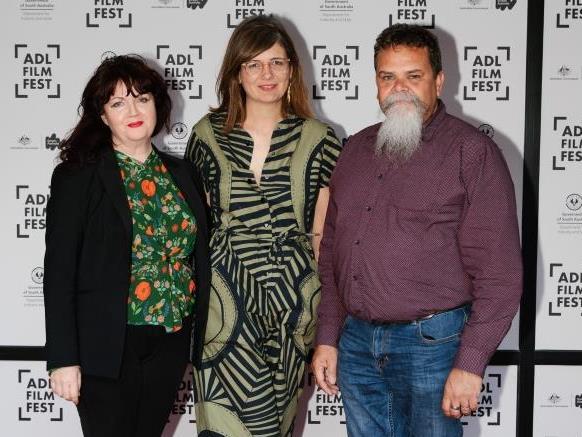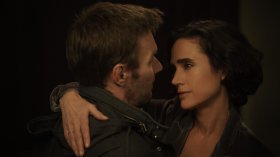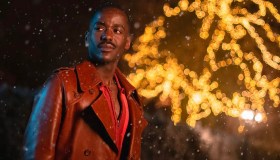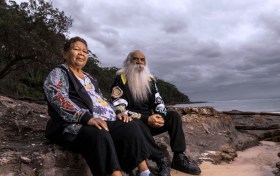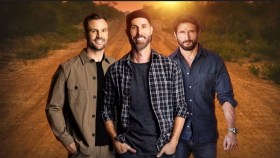SAFC CEO Courtney Gibson, The Wheeler Centre’s Head of Publishing Sophie Black and The Next Chapter recipient from South Australia Adrian Stanley. Photo by Josh Geelen.
The practice of adapting books to films is as old as the cinema itself. The common wisdom advises a canny screen producer to secure the rights to an established literary best-seller, thus guaranteeing a built-in audience for the film or TV version of the story. Or, if you’re an industry program like 37ºSouth’s Books at MIFF (BaM), you at least find a published book to adapt. But this model is turned on its head with a new collaboration between Melbourne’s Wheeler Centre for Books, Writing and Ideas, and the South Australian Film Corporation.
The focus here is on diversity, with the hope that fresh stories from the margins will make it onto both page and screen when emerging writers show their unpublished works to South Australian producers.
Announced earlier this week at the Made in SA Gala Screening at the Adelaide Film Festival, The Wheeler Centre and the SAFC announced Opening Scene, a three-year partnership where recipients of the Wheeler Centre’s innovative Next Chapter writers’ scheme will be given the opportunity to show their work to South Australian producers, who can read it with a view to optioning and developing it for film, television or online.
Talking to Screenhub, Sophie Black, the Wheeler Centre’s Head of Publishing, said the idea came from a long association she has had with the Adelaide Film Festival, under whose banner she headed up the Festival of Ideas back in 2013. Black had worked with ADL Film Fest’s Artistic Director Amanda Duthie, who sent along SAFC CEO Courtney Gibson to the launch of the Next Chapter initiative at the Sydney Writers’ Festival in May this year.
‘Courtney was immediately taken by the idea and could see an opportunity, as could we,’ says Black, a journalist and broadcaster whose previous roles include editor of Crikey and Editor in Chief at Private Media, as well as being a regular panelist on ABC TV’s Screen Time.
‘A key part of Next Chapter is about making sure the writers we’ve chosen are given as many opportunities as possible to elevate and promote their work,’ says Black, ‘and that includes the chance to meet producers as well as publishers, but only after they’ve focused on the work itself for a year.’
The first 10 recipients of the Wheeler Centre’s Next Chapter scheme were announced in September at the Newcastle Young Writers’ Festival (NYWF). There will be 10 more announced next year, and the year after, meaning 30 new works in total. Presented with support from the Aesop Foundation, each recipient receives the considerable sum of $15,000 and is matched with a suitable mentor to work intensively on their writing project over the coming year. In addition, the Wheeler Centre will support the writers to develop skills to talk about their work, pitch it and promote it.
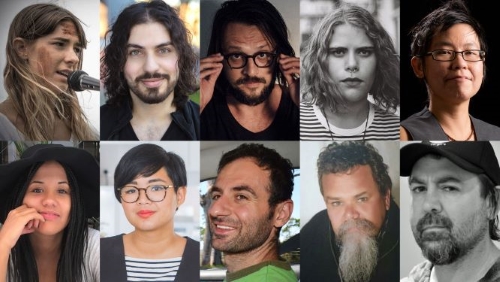
2018 Next Chapter recipients: L-R (Top): Evelyn Araluen, Jean Bachoura, Ennis Cehic, Nayuka Gorrie, Lian Low; L-R (Bottom): Yamiko Marama, Giselle Au-Nhien Nguyen, Ara Sarafian, Adrian Stanley, Adam Thompson. Image: Wheeler Centre.
Black says she would have been happy with 500 applications, but received an astonishing 1100 entries from around the country. The application process had been made especially accessible and the message had been sent loud and clear that the hunt was on for writers who represented the diversity of Australian society. The judges themselves illustrated this. They were Ellen Van Neervan, Benjamin Law, Maxine Beneba Clarke and Christos Tsiolkas.
Looking at the names, faces and locations of the recipients, there’s hardly a whiff of the white middle class. They are: Evelyn Araluen, poetry (Windsor Downs, NSW);Giselle Au-Nhien Nguyen, memoir (Brunswick East, VIC);Jean Bachoura, memoir (Taylors Lakes, VIC); Ennis Cehic, short fiction (St Kilda, VIC); Nayuka Gorrie, non-fiction (South Lismore, NSW); Lian Low, young adult speculative fiction (Footscray, VIC); Yamiko Marama, memoir (St Kilda West, VIC); Ara Sarafian, comic fiction (Kew, VIC);Adrian Stanley, young adult fiction (Mount Compass, SA); and Adam Thompson, short fiction (Trevallyn, TAS).
In search of risky work
‘It was part of our remit,’ says Black. ‘We were very upfront about looking for voices that may have found it hard to break into the publishing industry previously and may come from marginalised communities. We were looking for stories that for various reasons, commercially, might be trickier to tell or might take more time and care.’
Black cites the example of one recipient who had been advised to change his last name in order to increase his chance of being picked off the publisher’s slush pile. ‘There are well and truly barriers still in place for a lot of people, so this scheme was a recognition of that and a recognition of the need to invest in time and care and risk, and by that I mean in “risky work”. Risky work for a publisher can mean something as simple as a genre like poetry. To them that’s something that’s not necessarily going to fly off shelves.’
The idea is for the writers to concentrate on their work for a year before they show it to publishers or screen producers.‘We want the writers to be able to solely concentrate on their work during that year because so often things get rushed in the publishing world,’ says Black. ‘The publishers we’ve spoken to are really on board with this as they see it as a genuine attempt to give writers time and space before they enter into relationships.’
As for introducing the first cohort of writers to producers, this will happen in November 2019, to coincide with the Screen Forever producers’ conference. Black says the Opening Scene program will ‘coach them through what optioning means and what the process involves, how to pitch their work, and then give them the opportunity to meet producers, and in turn those producers will have an opportunity to option that work.’
As for what’s in it for producers, optioning one of these works is going to be a cheaper option than securing an established best-seller. This will appeal to up and coming producers with an experimental or innovative approach. (Personally, we’d love to see a poetry adaptation.) According to Black, the real value for producers comes from the time and effort that’s already been made to source the writing talent. ‘We have travelled around the country and put in a lot of resources to finding these unique voices and I think producers will gain the benefit of that.’
The screen sector leading the way
We asked Sophie Black how she thinks the world of publishing and filmmaking are coming together in Australia at the moment. ‘I think that in terms of a push for diversity, the screen industry has really led the way in the last couple of years,’ she said. ‘There’s a real recognition that things need to change. I think the publishing industry is coming on board a bit later and it’s a really interesting conversation that’s being mirrored across the screen and across the page. It’s going to change the face of the stuff we consume in the next decade.’
She mentions reading Ben Law’s recent Monthly cover story on the Golden Age of Popular Indigenous Storytelling. ‘It made me think about how innovative the support for Indigenous screen content has been, and how it’s been a long game over decades. In publishing there’s a lot we can learn from that in terms of ensuring systematic change. Opening Scene is a part of that, an acknowledgement that you need to put systems in place in order to change gears. It’s playing the long game.’
Speaking of book to film adaptations, we asked Sophie Black what her favourite Australian ones were. Here’ what she had to say:
Storm Boy: ‘The first film I ever sobbed in, can’t even see a still from it without tearing up.’
Looking for Alibrandi: ‘There’s such enduring affection for both the book and the adaptation.’
Picnic at Hanging Rock: ‘That soundtrack, the thrumming menace of the bush…shows what the screen can capture that the page sometimes can’t.’
Rabbit Proof Fence: ‘Undeniably played a role in shifting the national conversation around the stolen generations.’
To find out more about Next Chapter and Opening Scene, visit The Wheeler Centre.
